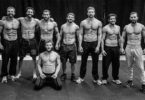I’m not naturally talented at anything.
I used to think I had a natural talent for writing, but then I ran the numbers. Years of being read to, taken to the library, bought books and – on a couple of memorable occasions – being giving merciless punctuation pop-quizzes by my parents. More years of writing thousands of words that I never sent to anyone, followed by a year of sending out scattergun on-spec features to a variety of magazines, with something like a 1:10 success ratio, to magazines while I was at university. Then a few more years writing for videogames magazines – traditionally more tolerant of interesting/ridiculous ‘concept’ pieces than more established media – which, I figured out once, totalled more than a million words. All of it accompanied by relentless self-criticism, and loads of it was terrible. Some of it is still terrible. Conclusion: I might be pretty decent at writing, but I’m not naturally talented at it. I spent a long time getting here.
The idea that constant, deliberate practice is both necessary and sufficient to succeed in almost anything is pretty well-established these days. Anders Ericsson was the first man to popularise what’s now known as The 10,000 Hour rule, which suggests that nobody at the top level of chess, music, business or fighting has got there without putting in roughly 10,000 hours of deliberate practice…and that anyone who puts in that much practice will definitely be able to compete at the very highest of levels (in the absence of some genuine non-arguable setback, like being 5’0 if you want a career in the NBA). Even if you haven’t got 10,000 hours – a long time, considering how demanding ‘deliberate’ practice is – this should reassure you that you aren’t wasting your time, no matter how futile your early attempts at anything are. Books like The Talent Code, Outliers, Bounce and Talent Is Overrated all tackle the same body of research from different directions, and you should definitely read one/all of them.
What they won’t do, though, is make you believe it.
Understanding the theory is important, maybe even essential, but you’ll never know – instinctively know, like you know that gravity happens and fire is hot – that you can improve at anything without improving at one thing you think you’re bad at. The key is picking the right thing.
Writing is a terrible choice for your ‘thing’. You could ‘fail’ at writing for all sorts of reasons that have nothing to do with your writing talent – maybe you pitch to the wrong people, the market isn’t there for what whatever you’re doing, you’re too self-critical to let anyone see anything, and so on. You can ‘succeed’ with shitty writing for almost as many. Fighting is better, but only just. So what’s the best ‘thing’? Easy.
Weight training.
Weight training is great because the numbers don’t lie. However ‘talented’ you are, however strong or weak you are when you start, if you do the work the numbers will go up. They’ll go up quickly at first, then you’ll hit a brick wall. At that point you’ll need to find a programme, make a plan, put it into practice, tweak things, experiment, work harder…and ultimately, watch your lifts go up. There: you’ve improved, thanks to your own efforts. After you’ve done that, maybe you take up climbing, and go from a V2 to a V4 – because, again, you’ve put in the time, done the work, and improved. Then maybe you read up on some basic science, even though you thought you weren’t ‘talented’ at it at school, and realise that it wasn’t actually that hard after all. Then you learn Japanese, or take up ballroom dancing, or do another one of the hundred things you thought you weren’t good at, when actually what happened was that you just never put the time in. When you work this out, it feels miraculous – but you have to start somewhere.
I’m not naturally talented at anything. But I know that I can do anything I want. Do you know the same?
HOMEWORK: Read either The Talent Code, Outliers or Talent Is Overrated. Pick something you think you’re ‘bad’ at – preferably with easy-to-quantify results. Get good at it. Repeat until you’re Lex Luthor.





So you’re saying you’re not superman, you’re batman?
In apparent opposition to the “anti-talent” books, see The Blank Slate by Steven Pinker or watch the TED talk for a shorter version.
Any study which tries to say whether a person can have innate talents is worthless unless it adjusts for genetics. If it doesn’t compare identical twins separated at birth with adopted siblings of different parents, it says nothing about nature/nuture.
I’ve read the Blank Slate but it was years before I read any of the Ericsson stuff – maybe I’ll take another look. And there’s certainly more to this area than I can tackle in a blog post. But, three things:
1. There are dozens of documented situations in which the people who’ve simply put the most hours in at a specific discipline are unarguably the best – not just ‘good’, but the very best in the world. Look at the Polgar sisters in chess, or Marcelo Garcia in Brazilian jiu-jitsu. The Polgar sisters are an especially good case, because they didn’t even drift into chess because they were naturally good at it – they practised it from birth.
2. At a lower level – ie, my level, or the level of most people who’ll read this blog – natural talent doesn’t really matter, because you can unquestionably get very good – if not world class – at anything by simply doing it loads, in a sensible way. Unless someone comes out with a study full of people who’ve practised for hundreds of hours and stayed rubbish, then I’m convinced of that.
3. While I like Ben Goldacre’s Bad Science and think it’s basically required reading, I think it’s led to a bit of a tendency to refuse to believe in anything that hasn’t been proved by a peer-reviewed, double-blind, perfectly-controlled study. That’s fine, but if you’re only going to make your decisions based on that sort of evidence, you’re going to be decades behind the people working off anecdotal evidence and kicking ass.
And yes, I do like to think of myself as Batman. Sorry, that’s four things.
Joel,
Yep it’s a bit topic for a blog post, but I figure you opened this can of worms and, who knows, maybe it will lead to spin-off posts?
1. “Putting in the hours”
I certainly think examples like the Polgar sisters show it’s likely most people have a lot of potential that they never discover due to time/motivation constraints.
But I think it’s a bit of a leap to suggest that anyone could become a chess grandmaster if they had practiced from birth.
It should be uncontroversial that some people are born incapable of the reasoning required for chess. You might call them mentally sub-normal or some less politically-correct term. I don’t think it’s as simple as saying that everyone who doesn’t fall into that category is equally “normal”. From there we have every shade along the scale to razor-sharp mentalissimo. Same goes for every mental trait. Maybe the top 25% could, with training, make grandmaster, maybe the top 80%.
Yes, the Polgar sisters were probably not exceptional to start with, but were probably above average given the type of Father they had.
Switching for a moment to physical training. I’m no expert on this, but there are well-known genetic factors in how well a person will respond to training. I expect you have seen the Aerobic fitness tests on the BBC. The conclusion seems to be that some people’s aerobic fitness does not improve at all with training, some improve a bit and some a lot. They can tell who will improve from a genetic test. Given that, it wouldn’t be surprising if there were other, as yet undiscovered, genetic differences to a person’s body or mind that can be construed as “talent”. (Next can-o-worms: gene-doping)
Finally there will be an element of self-selection. Anyone who has done the 10,000 hours training probably saw some improvement in the first hundred hours. Either that or they are weirdly dedicated and trusting. I’m guessing that most people are like me and enjoy something in proportion to how good they are at it. Kicking ass is fun! I wonder whether Mr Polgar would’ve continued his daughters’ training if they’d been only average at the age of ten.
2. “Ordinary level”
But for us ordinary folk we don’t have time to “do it loads”. Time is the cost and kicking ass is the benefit. If you want the maximum ass-kicking ability for the minimum time investment, pick something in which you have some natural ability. No one has the time to put even 1000 hours into every sport or activity available, so we need to find that out pretty quickly.
3. “Excessive evidence”
I think it depends on how important the question is. It’s fine to believe some things tentatively. The problems come when people get passionate about an idea without much evidence for it. As a new parent I’m discovering that pretty much every aspect of child-rearing has two camps each with more passion than evidence.
4. OK, you make a good Batman.
I’ll probably read one of those books you mentioned, too. Cheers.